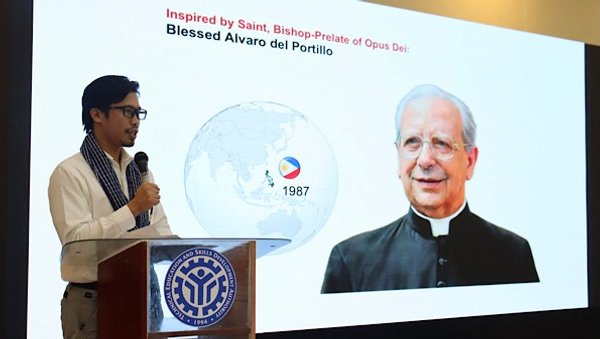The celebration of Blessed Alvaro del Portillo’s feast day earlier this month, on May 12, could not have been more significant in the wake of the election of a new pontiff.
Pope Leo XIV, who had served as a missionary in impoverished areas in Peru seems to hew closely to his predecessor, the late Pope Francis, who emphasized mercy & compassion especially for the marginalized.
That was an imperative not lost on Blessed Alvaro who, during his trip to the Philippines in late January 1987, witnessed how the Filipinos’ great faith co-existed with widespread poverty. That contrast persists to this day with economic activity picking up, and more urban centers and taller buildings sprouting, in tandem with shanties in informal settlements.
That observation led him to rally his sons and daughters — and all those benefiting from activities of formation organized by Opus Dei — to do what they can to address the big income disparity.
A group of individuals in Cebu, central Philippines, promptly sprang to action as they realized that education and skills development provide a long-term solution to poverty. In a bid to arm the underprivileged with skills that would help them find gainful jobs, this group established the Center for Industrial Technology and Enterprise (CITE) Technical Institute, Inc. in 1990.

Soon after he returned to Rome in 1987, Blessed Alvaro sent a team from Centro Elis, a technical school in Italy, to assist the people in Cebu in planning and starting up this technical school in Cebu.
Through the last 35 years, CITE’s three-year diploma programs have produced 5,479 alumni (including 1,317 graduating this year). The courses in mechanical engineering technology, electronics engineering technology, computer engineering technology, or electrical engineering technology employ a training system that merges 1.5 years of classroom and laboratory work with an equal duration of on-the-job industry exposure.

Addressing local needs, CITE has developed a separate six-month Industry Skills Training Program designed to arm youth with entry-level production technology skills. This effort has already benefitted 8,530 youth.
In addition, the school offers 40-90 hour modules and customized courses that cater to the needs of local companies to scale up the technical skills of their workforce.
Aside from imparting technical knowledge and skills, CITE carries out individual mentoring of students to develop their human and social values and equip them with the necessary work ethic to get their jobs done, and done well.
Grants help students shoulder the costs of transportation, meals, and lodging. To this end CITE counts on the support of civic groups, local governments, NGOs, industry partners, alumni and generous individuals.

CITE’s focus jibes with the concerns that Pope Leo XIV bared in his first Mass with cardinals as Pontiff at the Sistine Chapel last May 9. In his remarks, the Holy Father spoke of “new challenges for the defense of human dignity, justice, and labor” posed by artificial intelligence (AI). The Pope likened the rise of AI to the late-19th Century Industrial Revolution that prompted then Pope Leo XIII to spell out the Church’s social doctrine in the encyclical Rerum Novarum. AI will definitely impact the work of laborers and technical workers.
CITE will be there with its foundational mission to give relevant training and formation to improve the plight of the working class and the poor, and providing quality skilled workers to industry. CITE graduates are appreciated by companies both here and abroad.
Those who wish to support CITE’s mission may contact the school via email info@cite.edu.ph.
